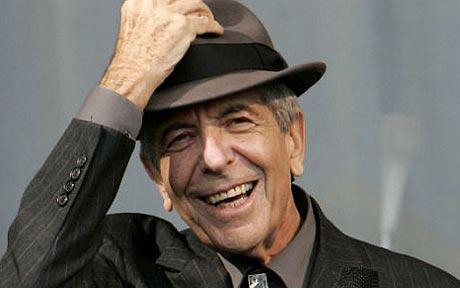I recently read that a few Catholic churches are using the famous refrain from Leonard Cohen’s “Hallelujah” before the reading of the Gospel at Mass. This is wildly inappropriate.
The song first appeared on an album Cohen recorded in 1984, but it remains a work in progress: Cohen repeatedly changes the lyrics in performances, although he has never improved the original. “Hallelujah” may be one of the great songs of the last century. It has been “covered” by hundreds of artists, has been a hit more than once (most recently by Jeff Buckley), and, although Mr. Cohen is properly circumspect about interpreting his own work (and many other exegetes strain credulity when they try), there’s no doubt that “Hallelujah” has its roots in Scripture: in the books of Samuel, Kings, Chronicles, and, the Psalms. But if I may join the perfervid interpreters, it’s also a gauntlet thrown down before God.
Cohen writes:
Now I’ve heard there was a secret chord
That David played, and it pleased the Lord
But you don’t really care for music, do you?
To whom is the lyric addressed?
Well, it may be to a lover – in a very Solomon-like, Song of Songs way – but I sense that Mr. Cohen, a Jew (also now a Zen Buddhist), may be addressing Jesus or, if not specifically Christ, then certainly the Church, the Catholic one, which Cohen sees as a congeries of humorless, life-denying scolds who have perverted the “simcha” (joy) of Judaism, including, perhaps, the pleasures Mr. Cohen has shared in his serial relationships with women.
It is often the case with poetry that the object of the poet’s attention is fluid. In “Hallelujah,” Cohen addresses King David and Samson and the moments in their lives when they broke faith with God (over women), and each of these is like some moment in Cohen’s own life, which he sees as every bit – mind and body and soul – as surely singable as were the lives of patriarchs and prophets. In one of his later midrashim of the song Cohen laments:
There was a time you let me know
What’s really going on below
But now you never show it to me, do you?
And remember when I moved in you
The holy dove was moving too
And every breath we drew was Hallelujah
As has been true of so many influential modern artists (I think of the painter Wassily Kandinsky or the filmmaker Ingmar Bergman), Cohen here comes hard against the silence of God. And yet . . . he still measures his life as if against divine judgment and so mounts his defense. In the original version’s most provocative lines, Cohen makes his summation (if not to God then to whom?):
You say I took the name in vain
I don’t even know the name
But if I did, well really, what’s it to you?
There’s a blaze of light
In every word
It doesn’t matter which you heard
The holy or the broken Hallelujah
Mr. Cohen has seen himself as a member of a priestly caste (the Kohanim, from whence his surname), which makes it odd that that he imagines facing the Lord and asking, “What’s it to you?” Here’s another unbeliever who can’t stop believing.
Post-modernist though he may be, Cohen frames even his disbelief in terms of a hallelujah, albeit the broken one, not the holy one. Leonard Cohen is our most melancholy troubadour. He has a lot of Nietzsche in him – that selfsame sorrow that must inevitably come from the inability to love God, which leads to such a mournful conclusion as this:
I did my best, it wasn’t much
I couldn’t feel, so I tried to touch
I’ve told the truth, I didn’t come to fool you
And even though
It all went wrong
I’ll stand before the Lord of Song
With nothing on my tongue but Hallelujah
Enough said about why “Hallelujah” doesn’t belong on the roster of hymns sung in a Catholic church – no more than Edith Piaf’s “Non, je ne regrette rien” should be played at funerals or The Police’s “Every Breath You Take” at wedding parties. Cohen’s song may serve as an agnostic’s plea before God; it’s surely not the alleluia Christians should be singing.
I don’t go to bars that have karaoke machines, but if I ever happen into one and friends convince me to sing a song, it’ll be Cohen’s anthem, and it won’t just be because “Hallelujah” is written in a forgiving key, or because –despite the lyrics – its melody rises gloriously from despair to hope, or because I can ignore the existentialist cri de coeur and imagine it’s really a psalm to my Lord. It will also be because the song really is a hymn. I have no hard evidence to cite in support of the contention, but I’ll bet “Hallelujah,” a song about doubt, has put more uncertain people on a sure path towards faith than has most Christian music recorded in the last quarter century. This may be why Mr. Cohen keeps trying to transform it into a more conventional love song, acidic though it may be; why he keeps trying to purge it of the spiritual longing that was so clearly its genesis.
What an irony there would be in that. Alleluia!
















